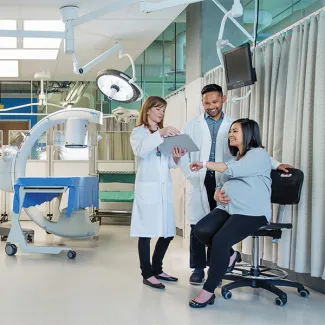Post-pandemic health care: a call for innovative leaders

By Cheryl Segaric, former program director of the Master of Health Leadership and Policy in Clinical Education
The past two years of the COVID-19 pandemic have been a period of intense uncertainty that will continue to contribute to major shifts in health care and how it is delivered. While there are still many unknowns about what the future of health care will look like, I believe that the four key themes will shape the directions and opportunities ahead: innovative leadership in healthcare, human resources planning, informatics and the value of interprofessional collaboration.
Effects of the COVID-19 pandemic on health care
The challenges of COVID-19 have laid bare what we already knew: the shortage of nurses and other health-care professionals is having a profound impact on our health-care system. We simply haven’t prepared to build a sustainable workforce.
Addressing this is not easy and will require rethinking health professional education, ways to streamline folks into the system and succession planning. Informatics and the move to virtual health is another area where the pandemic has pushed our sector forward. Before 2020, virtual health-care delivery was slowly being rolled out. COVID-19 dramatically accelerated that shift. Similarly, the move to informatics and an emphasis on data analytics will only speed up. We’re still in the early days of this, and so there is a need for expertise in the field to lead us forward.
The need for innovative leadership in healthcare
In any period of disruption or rapid change, there is a domino effect throughout all levels of the system. And that presents a pressing need for leadership – for professionals who can advocate and guide policy changes, lead in education and practice, and create positive workplace cultures where people are able to adapt to and thrive in new ways of working.
Many students come to the Master of Health Leadership and Policy in Clinical Education because they recognize that need for leadership within health care and see themselves working in those roles.
They’re seeking resources and the advanced education credentials that will empower them to move into these positions with confidence, or they may have already been vetted into clinical leadership roles and feel they need additional training to be truly effective.
Our program bridges the gap between theory and practice and helps students build the skills they’ll need to thrive as clinical leaders and educators.
On the clinical education side, we start at the macro level where students gain foundational knowledge and skill related to how to design, maintain and evaluate education programs and manage program development teams. At the micro level, students learn more about themselves as educators and educational leaders by learning how to create effective lesson plans and implement strategies to facilitate effective teaching/learning and learner engagement. Woven throughout this is an emphasis on acquiring interpersonal communication and leadership skills.
Much of the project work involves simulated learning approaches where students work in teams to gain those skills in interprofessional collaboration and teamwork. Assignments enable students to take a practical, pragmatic approach to the types of challenges they will actually be experiencing.
Another factor that sets our program apart is the excellence of our instructors, who have extensive experience in practice and are able to link students to other leaders in government and the healthcare system.
Becoming innovative leaders
The breadth of opportunities available to our graduates is wide. We’ve seen that the MHLP in Clinical Education is a springboard for multiple career pathways, without graduates being hired as clinical educators and clinical leaders, as well as senior leaders in quality and safety initiatives, and in project management. For health-care professionals who are interested in teaching within post-secondary institutions, our program also provides the foundation in education that prepares them to successfully transition into these roles.






